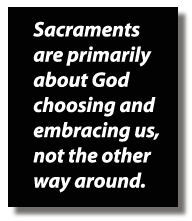American Catholic Press
16565 S. State Street, South Holland, Illinois 60473
|
||||||||||||||||||||
|
|
||||||||||||||||||||
|
||||||||||||||||||||
by Monsignor Joseph Champlin As the pastor of a large suburban parish, I once interviewed most
of the 75 candidates for that year’s Sacrament of Confirmation.
They were generally high school sophomores and had completed the
required standard two-year preparation program. Questionable Assumptions Portland, Maine — Some Dioceses in the United States have arrived at negative answers to those questions and changed their procedures for Confirmation preparation and celebration. The diocese of Portland in Maine developed early on a totally different approach. Bishop Joseph Gerry’s September 1997 “Pastoral Letter on the Celebration of Confirmation and First Communion,” established this norm: All parishes should move in the direction of the reception of confirmation before First Communion. Pastors should introduce preparation for confirmation into the faith formation of second graders as soon as it is pastorally appropriate and should include the celebration of confirmation in the same liturgy as their first reception of the Eucharist. Recognizing that this changeover will take two to three years to implement properly, he also urged that faith formation programs, especially for junior high students, be interesting and challenging to attract young people. Five years later,
Resource Publications in
San Jose, California published
a text Celebrating
Confirmation Tyler, Texas — Bishop Alvaro Corrado del Rio on Oct. 7, 2005, introduced a similar shift in the procedure for confirmation in the diocese of Tyler in East Texas. In doing so, he also addressed some of those questions noted above: Confirmation a Gift: “At no point are the sacraments about what we have done or promise to do for God. They are God’s free gift of grace to us. Sacraments are primarily about God choosing and embracing us, not the other way around.” Confirmation not a graduation rite: “Thus it is not accurate to connect confirmation to maturity in the psychological sense so that it would be best given at an age of social maturity. The sacrament of confirmation strengthens the person to bear witness rather than expresses the person’s determination to bear witness to his faith.” Eucharist, not Confirmation, is the central event: “For a Christian publicly to take his place in the eucharistic assembly is the greatest participation in the apostolic mission of the Church that is imaginable. It is through the grace of baptism and confirmation that the Holy Spirit and the Church prepares a person for full communion in the holy Eucharist. Reception of the Eucharist prior to receiving the sacrament of confirmation may create some confusion in the community or. the person.” I have no knowledge as to the number of other U.S. dioceses which have adopted the Portland and Tyler models.
|
||||||||||||||||||||

 Before
First Communion, prepared by
leaders of the Portland
diocese. I found of particular
interest a section
on “Youth Ministry
Observations.” My
impression then: We
would expect a decline
in teenage attendance at
religious education sessions and a deterioration in
the programs themselves following this move of confirmation to an earlier level.
Quite the opposite happened.
Before
First Communion, prepared by
leaders of the Portland
diocese. I found of particular
interest a section
on “Youth Ministry
Observations.” My
impression then: We
would expect a decline
in teenage attendance at
religious education sessions and a deterioration in
the programs themselves following this move of confirmation to an earlier level.
Quite the opposite happened.